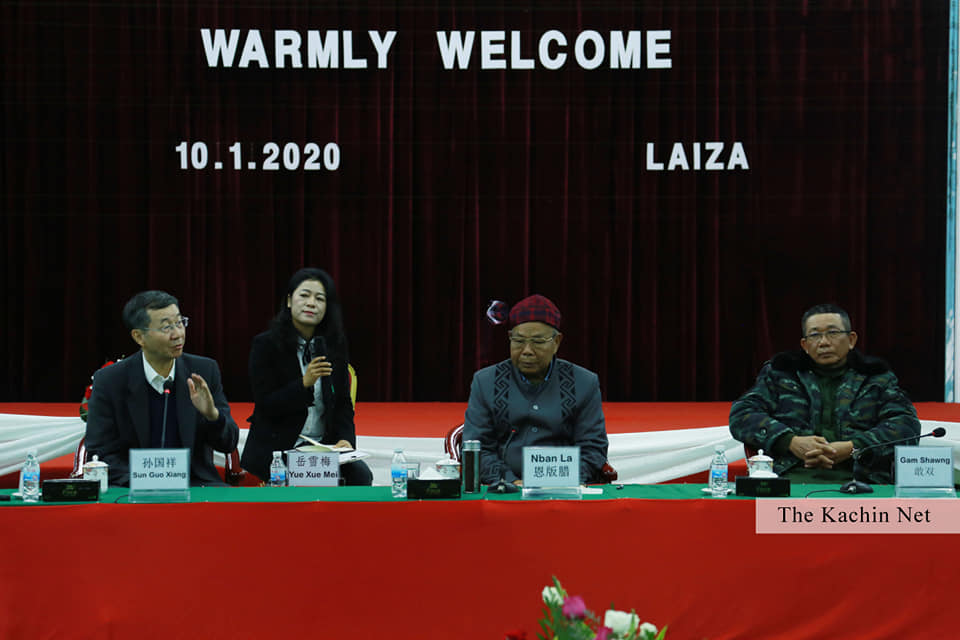Ahead of Chinese President Xi Jinping’s trip to Myanmar on Friday, ethnic armed groups based in the northeast region of the country welcomed the diplomatic trip, wishing it success and calling for Xi’s help to achieve peace and stability.
On Thursday, the Kachin Independence Organization (KIO), an ethnic armed group based near the Myanmar-China border, issued a statement extending a warm welcome to Xi.
The Chinese president’s trip is seen in part as an effort to boost economic relations along the countries’ shared border, as well as Chinese investment in other parts of the country under its Belt and Road Initiative and infrastructure projects under the China-Myanmar Economic Corridor. According to Xi, the key focuses are on implementation of infrastructure projects, especially the Kyaukphyu Special Economic Zone’s deep seaport project in Rakhine State, western Myanmar; the China-Myanmar Border Economic Cooperation Zone in north and northeast Myanmar; and the New Yangon City project.
The KIO added it hopes that President Xi’s trip, on the occasion of the 70th anniversary of Myanmar-China diplomatic ties, would strengthen relations between the two countries, as well as help achieve a stable peace and end Myanmar’s civil war.
The organization called on Xi “to help us … having understood the need of the country and the will of the people, [though] there may [be] different views reflected on the statements of the civil society group[s].”
The comment may refer to the fact that nearly 40 civil society organizations (CSOs) called on Xi to permanently terminate the suspended Myitsone Dam project in an open letter on Wednesday, saying the project threatens the prosperity of the Myanmar people and that friendly relations between the two countries will deteriorate if it goes ahead. The Myitsone hydropower dam project was suspended under then President U Thein Sein in 2011 following a public outcry.
Like the KIO, two other ethnic armed groups—the United Wa State Army (UWSA) and the Mong La’s National Democratic Alliance Army (NDAA), also known as Shan State Special Region 2 and 4 respectively—welcomed Xi’s trip in their respective statements.
All of the groups’ controlled areas directly border China and “each have unique relationships with China in tackling the border issues”, thus it is important for the groups to extend welcoming remarks, according to U Maung Maung Soe, a political and ethnic affairs analyst.
“These three groups are based along the Myanmar-China border and are not under the control of the Myanmar government. Unlike other ethnic armed groups, the Wa, Mong La and KIA have special direct relations with China,” he explained.
Being among the militarily strong EAOs, all of the groups have for decades acquired from China the armaments they use to fight the Myanmar government. During the celebrations of the 30th anniversary of its making peace with the government, held in April last year, the Wa showcased its army, which is equipped with sophisticated weapons systems. China provides arms, ammunition and technical support to the UWSA, which has 30,000 soldiers and 20,000 auxiliary troops, making it one of the strongest ethnic armies in Myanmar.

Chinese-made weapons are also used by other EAOs. In November, the Myanmar military said weapons captured from the Ta’ang National Liberation Army (TNLA) in Namhsan Township, northern Myanmar, including RPGs and FN6 anti-aircraft launchers, were Chinese made.
In addition, both the UWSA and KIA locally make arms and ammunition with Chinese technical support and help arm other groups like the Arakan Army.
On Wednesday, the UWSA-led Wa State People’s Government said in a statement that it “wish[es that] the economic, trade and infrastructure building of China’s Belt and Road Initiative and China-Myanmar Economic Corridor [bring] benefits for the backward areas in northern Myanmar as soon as possible.”
It added that attaining peace in northern Myanmar “is closely related to the relationship of our two countries and our people.” Therefore, “The Wa State sincerely hopes that China can play a positive and constructive role in it and that the leaders of our two countries can find a feasible solution fitting the situation of … northern Myanmar… The Wa State is willing to make necessary contributions for it.”
Mong La’s NDAA also expressed hope that Xi’s visit “would help to push forward the peace process, under its Belt and Road Initiative.”
U Maung Maung Soe told The Irrawaddy that he does not expect Xi will focus on the details of the Myanmar peace process, as the Chinese president’s priority will be economic and trade issues.
“I think he will let the special envoy deal with the issue, rather than he himself personally intervening in peace issues,” said U Maung Maung Soe.
Prior to Xi’s visit, the Chinese special envoy for Asian affairs, Sun Guoxiang, last week separately met the UWSA, NDAA and KIO in their controlled areas.
On Jan. 10 in Laiza, the KIO headquarters, the special envoy met the members of the Northern Alliance, of which the KIO is a member. The Northern Alliance comprises the KIO; the Myanmar National Democratic Alliance Army (MNDAA); the Ta’ang National Liberation Army (TNLA); and the AA. All are currently fighting the Myanmar military.
Although it was billed as one of China’s regular meetings with its partners in the New Year period, Sun is brokering peace talks between the government and these groups.
The planned peace talks between the Northern Alliance and the government’s negotiators this month were postponed to next month, according to U Maung Maung Soe, as one of the groups, Kokang’s MNDAA, will be busy celebrating the Chinese New Year, or Spring Festival, which falls next weekend.
You may also like these stories:
Myanmar, China to Sign Agreements on SEZ, Border Economic Cooperation During President Xi’s Visit

















